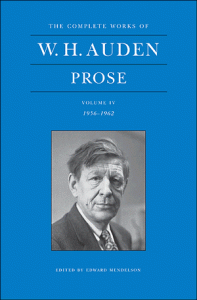The Complete Works of W. H. Auden: Prose, Volume IV, 1956-1962
Edward Mendelson, Editor
Princeton University Press
982 pages, $65
POETS WRITING literary criticism do so to generate income, to communicate æsthetic values to the public, and to build an audience for their imaginative work. Would readers of the 1950’s and 60’s have paid much attention to Randall Jarrell the poet if he hadn’t been a sharp-witted and engaging critic? Probably not. As for W.H. Auden, I can offer some personal testimony from nearly four decades ago. I didn’t get very far with reading Auden’s poetry until by chance I stumbled on The Dyer’s Hand (1962), a collection of his essays and lectures. Massively intelligent and lucidly written, they convinced me to spend more time with his poetry. After acquiring some familiarity with it, I returned to the prose and saw how it reflected themes and approaches in his poems. Crisscrossing between the two genres illuminated both, which, as I soon saw, co-existed in a symbiotic relationship, and not only at the æsthetic level, but also at a practical level.
With his Oxford degree as a credential, Auden had done some primary and secondary school teaching early on, but after the 1940’s he never again took salaried work. Commissions for opera librettos and resulting royalties, public lectures, and critical pieces provided him with the income needed to support his poetry habit. He turned out vast amounts of copy, and you can’t help wondering if he’d have managed to write so much without the amphetamines he took every morning throughout this period.






